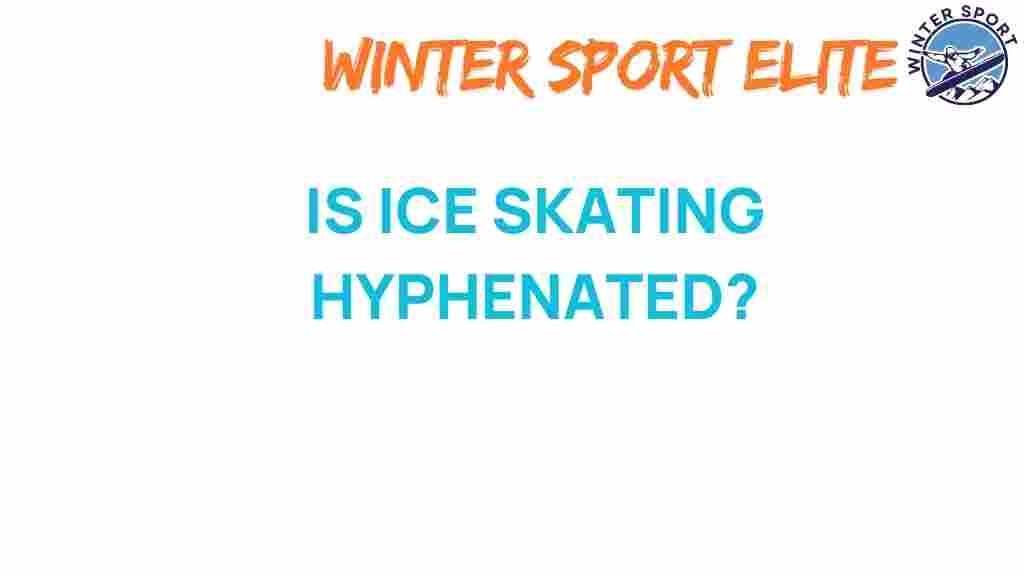Is Ice Skating Hyphenated? Unraveling the Grammatical Mystery
When it comes to language, nuances and rules can often lead to confusion. One such mystery that many encounter is the hyphenation of compound phrases, such as “ice skating.” This article aims to clarify whether “ice skating” should be hyphenated, exploring grammar rules, language usage, and punctuation in a comprehensive manner.
Understanding Hyphenation
Hyphens are used in English to connect words and to indicate that they should be read together. However, not all compound phrases require hyphenation. Understanding when to hyphenate can enhance clarity and precision in writing. Here are some basic grammar rules regarding hyphenation:
- Compound Adjectives: When two words work together as an adjective before a noun, they are often hyphenated (e.g., well-known author).
- Numbers: Hyphens are used in compound numbers (e.g., twenty-one).
- Prefixes and Suffixes: Certain prefixes and suffixes require hyphenation, especially when clarity is at stake (e.g., re-enter).
Ice Skating: To Hyphenate or Not?
The phrase “ice skating” is a compound noun that refers to the activity of gliding on ice using skates. According to standard grammar rules, “ice skating” should not be hyphenated. Here’s why:
- It’s a Well-Established Term: “Ice skating” is widely recognized and understood as a single activity without the need for a hyphen.
- Common Usage: In general usage, people refer to it as “ice skating” in all forms of writing, from casual to formal.
- Clarity: Hyphenating it (i.e., “ice-skating”) could lead to confusion or misinterpretation as a compound adjective rather than a noun.
Therefore, unless you are using it in a specific context that requires clarity through hyphenation, “ice skating” should remain unhyphenated.
When to Use Hyphens with Ice Skating
Even though “ice skating” itself is not hyphenated, there are instances where hyphens may come into play when using related terms or phrases. Here are some examples:
- Ice-Skating Rink: When used as a compound adjective to describe a type of rink, you would hyphenate it (e.g., “The ice-skating rink is open.”).
- Ice-Skating Competition: Similar to the rink, this phrase is hyphenated when it functions as an adjective (e.g., “She won the ice-skating competition.”).
Common Grammar Rules and Language Usage
To fully grasp the concept of hyphenation and its application in phrases like “ice skating,” it’s essential to understand other related grammar rules and language usage principles:
- Compound Nouns: These are often not hyphenated unless the meaning is ambiguous. “Ice skating” is a clear compound noun.
- Adjective Order: When using multiple adjectives, remember the order of adjectives rule (opinion, size, age, shape, color, origin, material, purpose).
- Clarity in Writing: Always aim for clarity. If a hyphen makes the meaning clearer, use it judiciously.
Step-by-Step Process for Correct Usage
When writing about ice skating or any related terms, follow these steps to ensure correct usage and punctuation:
- Identify the Phrase: Determine if the term is a compound noun (e.g., ice skating) or a compound adjective (e.g., ice-skating rink).
- Assess for Clarity: Ask yourself if hyphenation adds clarity. If it does, proceed to hyphenate; if not, leave it unhyphenated.
- Maintain Consistency: Ensure that your usage is consistent throughout your writing. If one term is hyphenated, all related terms should follow suit if applicable.
Troubleshooting Common Issues
Even seasoned writers can encounter issues with hyphenation. Here are some troubleshooting tips:
- Ambiguity: If a phrase can be interpreted in multiple ways, consider hyphenation to clarify your meaning.
- Consult Resources: Refer to reputable grammar guides or style manuals for specific cases. Websites like Grammarly can provide helpful insights.
- Peer Review: Having someone else read your work can help catch errors or unclear phrases that may benefit from hyphenation.
Examples in Context
Let’s look at some sentences to illustrate the correct usage of “ice skating” and related terms:
- She loves ice skating during the winter months.
- The ice-skating rink was crowded on Saturday.
- After winning the ice-skating competition, she felt ecstatic.
In all these examples, notice how “ice skating” remains unhyphenated while related terms are hyphenated appropriately.
Conclusion
In conclusion, the phrase “ice skating” is not hyphenated when used on its own. Understanding the rules of hyphenation and the context in which you are writing is essential for clear and effective communication. Whether you’re writing an article about sports, composing a blog post, or simply engaging in casual conversation, knowing when to hyphenate can make a significant difference in how your message is conveyed.
If you have more questions about grammar rules or hyphenation, don’t hesitate to explore additional resources or consult with language experts. For further reading on grammar and punctuation, visit Purdue Online Writing Lab.
By mastering the nuances of language usage, you can enhance your writing and ensure clarity in your communication. Happy writing!
This article is in the category Gear and created by WinterSportElite Team
